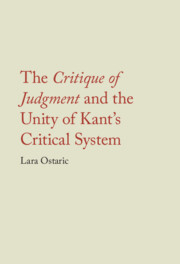Book contents
- The Critique of Judgment and the Unity of Kant’s Critical System
- The Critique of Judgment and the Unity of Kant’s Critical System
- Copyright page
- Contents
- Acknowledgments
- Note on Sources
- Kant’s Writings by Abbreviations Used for German Titles with Corresponding Translations
- Introduction
- Part I The Highest Good and the Postulates
- Chapter 1 Kant’s Justification of the “Fact of Reason” and the Objective Reality of Freedom from a “Practical Point of View”
- Chapter 2 The Highest Good and the Realism of Moral Glaube
- Chapter 3 Reflective Judgment and the Realism of the “Moral Image”
- Part II Aesthetic Judgment and the “Moral Image”
- Part III Teleological Judgment and the “Moral Image”
- Bibliography
- Index
Chapter 2 - The Highest Good and the Realism of Moral Glaube
from Part I - The Highest Good and the Postulates
Published online by Cambridge University Press: 15 August 2023
- The Critique of Judgment and the Unity of Kant’s Critical System
- The Critique of Judgment and the Unity of Kant’s Critical System
- Copyright page
- Contents
- Acknowledgments
- Note on Sources
- Kant’s Writings by Abbreviations Used for German Titles with Corresponding Translations
- Introduction
- Part I The Highest Good and the Postulates
- Chapter 1 Kant’s Justification of the “Fact of Reason” and the Objective Reality of Freedom from a “Practical Point of View”
- Chapter 2 The Highest Good and the Realism of Moral Glaube
- Chapter 3 Reflective Judgment and the Realism of the “Moral Image”
- Part II Aesthetic Judgment and the “Moral Image”
- Part III Teleological Judgment and the “Moral Image”
- Bibliography
- Index
Summary
This chapter clarifies how for Kant conforming our desire for happiness to the demands of morality leads to moral Glaube and the postulates of God’s existence and the soul’s immortality. I show that Kant’s conception of moral Glaube can be approached from both an anti-realist and a realist perspective. According to the former, moral Glaube is speculative reason’s “presupposition” of the objects of these Ideas in order to either avoid its own inner contradictions or to help one maintain one’s moral disposition. It is anti-realist in spirit because the assumptions that reason makes may have nothing to do with how things are in reality. However, if closer attention is paid to Kant’s neglected notion of practical cognition additional evidence becomes available for supporting an understanding of Kant as a realist with respect to moral Glaube and for explaining why the anti-realist interpretations do not adequately capture Kant’s view.
Keywords
- Type
- Chapter
- Information
- Publisher: Cambridge University PressPrint publication year: 2023

